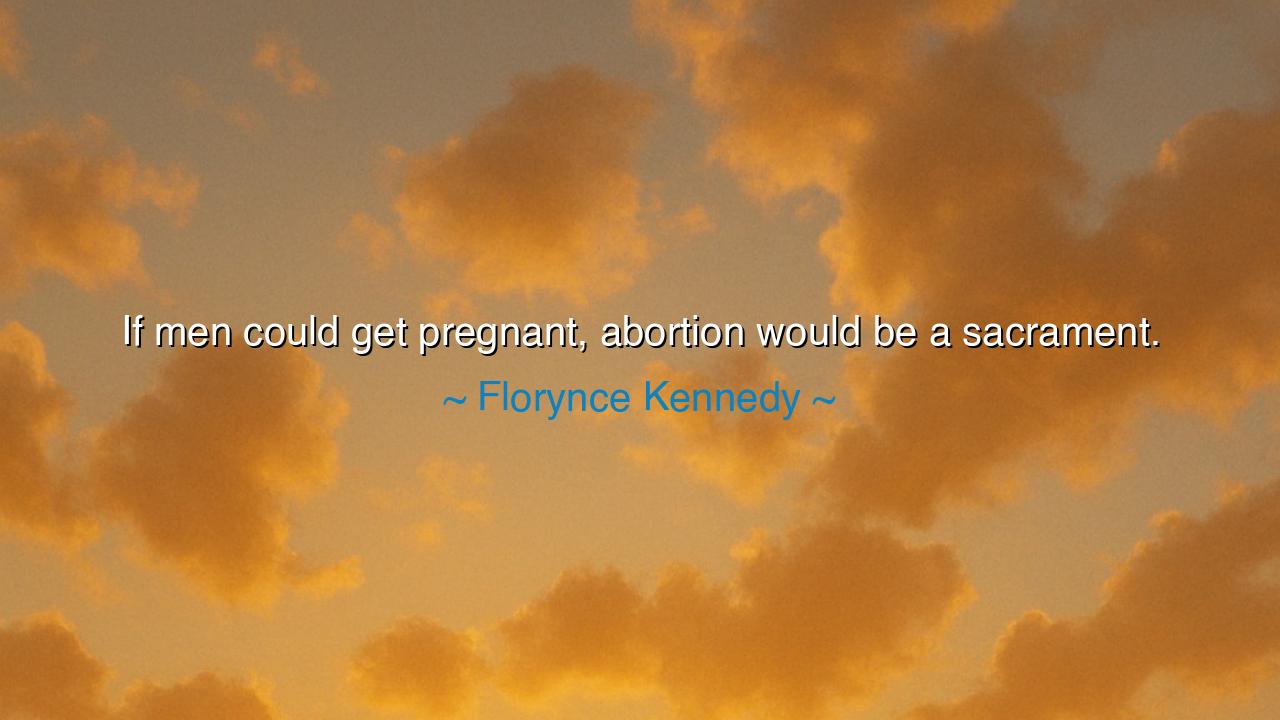
If men could get pregnant, abortion would be a sacrament.






Hear the fiery words of Florynce Kennedy, warrior of justice and fearless voice of feminism, who declared: “If men could get pregnant, abortion would be a sacrament.” This utterance, sharp as a sword and burning like a flame, unmasks the deep hypocrisy of society’s power. It shows how rules and judgments are too often written not by truth or compassion, but by those who hold dominion. For what is condemned when borne by women would be sanctified if it were the burden of men.
The origin of this saying lies in the struggle for women’s rights in the twentieth century. Kennedy, a lawyer and activist, saw how laws governing women’s bodies were crafted almost entirely by men, men who would never face the physical weight of pregnancy, yet presumed to dictate the moral boundaries of those who did. Her words were not only protest, but revelation: they revealed that the treatment of abortion was not about morality alone, but about power, control, and who was allowed to shape the world’s definitions of sacred and profane.
Consider the history of Rome, where decisions of law and religion were made in the Senate, a chamber of men. If pregnancy had been their burden, if the fate of their bodies were bound to childbirth, would they have called it sin—or would they have built temples, rituals, and honors around the right to decide? Kennedy’s point is piercing: society’s view of morality often bends with who suffers and who holds authority. When the powerful bear no cost, the powerless are chained by rules that the powerful themselves would never accept.
The story of Margaret Sanger, founder of the birth control movement in America, shows this truth in action. She fought to give women control over their reproduction, believing that without it, women could never be free. Yet she was opposed, ridiculed, even jailed by men who spoke as guardians of morality. If those men had known the burden of endless pregnancies themselves, would they have resisted her cause? Or would they have embraced it as divine necessity? Kennedy’s words expose the double standard at the heart of such resistance.
But Kennedy’s quote also speaks beyond the issue of abortion—it is about the deeper injustice of gendered power. It reminds us that many structures of society are not rooted in absolute truth, but in perspective: the perspective of those who rule. What is praised in men is condemned in women; what is freedom for one becomes sin for the other. To challenge these structures is to reveal their fragility, to unmask the arbitrariness of power disguised as eternal law.
The lesson, then, is clear: justice must not be measured by the experience of the powerful alone. We must ask always: who suffers under this law, and who escapes it? Who is silenced, and who is heard? Kennedy’s words remind us to test every commandment of society by this question, lest we mistake prejudice for morality and control for righteousness. The sacrament of one may be the oppression of another, unless equality is established.
Therefore, O listener, let this wisdom be carved into your conscience: never accept as sacred a law that burdens one half of humanity while sparing the other. Seek always to balance compassion with justice, to measure rules not by who proclaims them, but by who bears their weight. Stand with those whose voices have been silenced, for their cries reveal the hidden injustices of the world. And remember Kennedy’s defiant truth: if men bore the same burdens as women, the world’s laws and rituals would look very different.
So live with vigilance and with courage. Do not let tradition or authority blind you to hypocrisy. Test every law, every rule, every so-called truth against the scale of equality. And where injustice is found, speak boldly, as Florynce Kennedy did, with fire that unmasks falsehood. For only then will society rise from hypocrisy into true justice, where no sacrament is reserved for the powerful alone.






AAdministratorAdministrator
Welcome, honored guests. Please leave a comment, we will respond soon